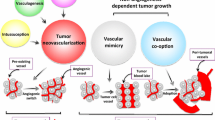Abstract
Greater knowledge in cancer biology has led to the isolation of molecular targets implicated in cell physiology. New treatments blocking a specific molecular target, in particular compounds blocking kinase activity, which play a key role in the transmission of the proliferation or angiogenesis signal, called molecular targeted therapies (MTTs), have shown benefit for several tumors and now are widely used including oral small molecules and monoclonal antibodies. Nevertheless, MTTs can inhibit major pathways in normal or non cancerous cells leading to unexpected off-target side effects, morbidity, reduced drug doses or even drug cessation. The combination of anti-angiogenic therapies with other MTTs could be challenging because of drug interactions or side effects.
Résumé
Une plus grande connaissance de la biologie des cancers a permis d’identifier des cibles thérapeutiques. De nouvelles thérapies qui bloquent des altérations moléculaires impliquées dans les processus oncogéniques ont été ainsi développées, et qui sont désignées par le terme « thérapies moléculaires ciblées » (TMC), que ce soit des anticorps monoclonaux ou des inhibiteurs de tyrosine-kinase. Cependant, ces TMC ont aussi des effets secondaires qui peuvent entraîner un arrêt du traitement ou des diminutions de doses. La combinaison des antiangiogéniques avec des TMC s’est montrée particulièrement difficile compte tenu de problèmes de toxicités ou d’interactions médicamenteuses.
Similar content being viewed by others
Références
Attard G, Reid AH, A’Hern R, et al. (2009) Selective inhibition of CYP17 with abiraterone acetate is highly active in the treatment of castration-resistant prostate cancer. J Clin Oncol 27(23): 3742–3748. Epub 2009 May 26
Baselga J, Cortés J, Kim SB, et al. (2012) Pertuzumab plus trastuzumab plus docetaxel for metastatic breast cancer. N Engl J Med 366(2): 109–119. Epub 2011 Dec 7
Dancey JE, Chen HX (2006) Strategies for optimizing combinations of molecularly targeted anticancer agents. Nat Rev Drug Discov 5(8): 649–659. Review
Feldman DR, Baum MS, Ginsberg MS, et al. (2009) Phase I trial of bevacizumab plus escalated doses of sunitinib in patients with metastatic renal cell carcinoma. J Clin Oncol 27(9): 1432–1439. Epub 2009 Feb 17
Hanahan D, Weinberg RA (2011) Hallmarks of cancer: the next generation. Cell 144(5): 646–674. Review
Hecht JR, Mitchell E, Chidiac T, et al. (2009) A randomized phase IIIB trial of chemotherapy, bevacizumab, and panitumumab compared with chemotherapy and bevacizumab alone for metastatic colorectal cancer. J Clin Oncol 27(5): 672–680. Epub 2008 Dec 29
LoRusso PM, Anderson AB, Boerner SA, Averbuch SD (2010) Making the investigational oncology pipeline more efficient and effective: are we headed in the right direction? Clin Cancer Res 16(24): 5956–5962. Review
Molina AM, Feldman DR, Voss MH, et al. (2011) Phase I trial of everolimus plus sunitinib in patients with metastatic renal cell carcinoma. Cancer doi: 10.1002/cncr.26429
Négrier S, Gravis G, Pérol D, et al. (2011) Temsirolimusandbevacizumab, or sunitinib, or interferon alfa and bevacizumab for patientswithadvancedrenal cell carcinoma (TORAVA): a randomised phase II trial. Lancet Oncol 12(7): 673–680. Epub 2011 Jun 12.
Soria JC, Massard C, Izzedine H (2009) From theoretical synergy to clinical supra-additive toxicity. J Clin Oncol 27(9): 1359–1361. Epub 2009 Feb 17
Tol J, Koopman M, Cats A, et al. (2009) Chemotherapy, bevacizumab, and cetuximab in metastatic colorectal cancer. N Engl J Med 360(6): 563–572. Erratum in: N Engl J Med 2010; 363 (26): 2573
Author information
Authors and Affiliations
Corresponding author
About this article
Cite this article
Massard, C. Agents antiangiogéniques et association de TMC: attention danger. Oncologie 14, 226–229 (2012). https://doi.org/10.1007/s10269-012-2143-z
Received:
Accepted:
Published:
Issue Date:
DOI: https://doi.org/10.1007/s10269-012-2143-z




